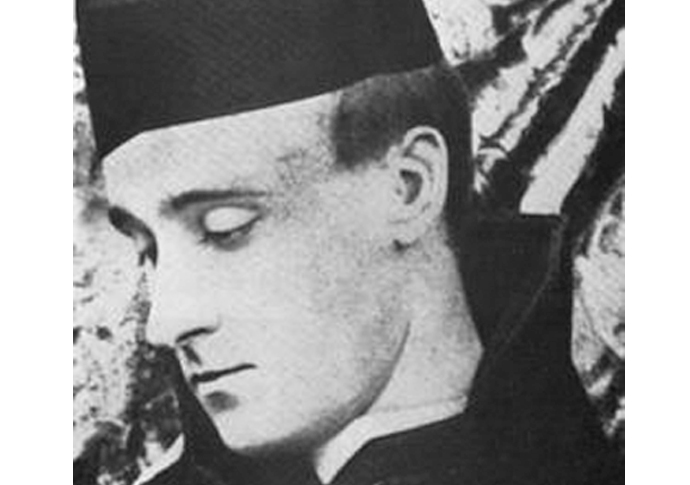Baron outlook
Neil Titley’s latest eminent Camden Victorian is the pimp, pauper and phoney Father, Frederick Rolfe
Thursday, 14th December 2023 — By Neil Titley

Frederick Rolfe
WITH the departure of Hecksher and Co from its premises on Bayham Street in 2014, Camden lost the last remnant of its once-thriving piano manufacture industry.
During the late 19th century, over 100 mainly family firms in north London dominated the world market and among them the Rolfes were prominent.
However, the man destined to become their best-known member decided against joining the firm.
Having left his Camden school aged 15, Frederick Rolfe (1860-1913) embarked on a life as a writer, confidence-trickster, blackmailer, photographer, painter, pimp and pauper of whom the writer DH Lawrence said: “He seems to have been a serpent of serpents in the bosom of the 1890s. That in itself endears him to one.”
The salient point of Rolfe’s life was his enduring need to become a Roman Catholic priest. This was thwarted first by his ejection from the St Marie’s College of Oscott in Birmingham, and then from the Scots College in Rome, mostly due to outstanding bills. After a fiery interview with the rector, Rolfe departed snarling about “the pestilent, pretentious, bestial insanity” of the Scots College.
The one positive result of his Italian sojourn was his friendship with the very elderly Duchess Carolina Sforza, who gave him an small allowance and permitted him to use the honorary (but virtually meaningless) title of “Baron Corvo”.
Still obsessed with his sense of vocation, he determined to muddle through until the Church agreed to accept him into the priesthood.
Having failed to build a career in photography in London, he moved on to Aberdeen, where he was sacked from his new job as tutor to the Laird of Seaton. “Baron Corvo” was now in dire financial straits.
The landlord of his lodgings in Aberdeen, faced with several weeks of unpaid rent, resolved to remove him from the house. Rolfe was equally determined to stay and refused to leave his room, or even move from his bed, in case he was ejected by surprise.
At length, the landlord secured the services of two burly workmen who arrived in Rolfe’s bedroom. Rolfe grabbed the iron bedstead and clung on grimly. His fingers were prised open and he was dragged out to the staircase. The banisters provided a further hold and the struggle resumed. Superior strength won the day and Rolfe was hurled, still in his pyjamas, out into the street as his possessions cascaded around him from the bedroom window.
Rolfe next appeared in 1895, calling himself “Father Austin”, at Holywell, near Flint in North Wales. He secured the commission to paint a series of religious banners celebrating the well of Saint Winefride. For a short time this arrangement seemed to work, despite “Father Austin’s” occasional trips to Rhyl to hire prostitutes.
On completion of the banners, Rolfe demanded the outrageously large payment of £1,000. When this was rejected, Rolfe began a campaign of vilification that included hunger strikes and shouting abuse at the priest as the latter led religious processions to St Winifride’s miraculous well.
Turning to literature, Rolfe accepted a commission to write a book on the notorious and literally poisonous Borgia family. After spending years researching and unveiling their vast genealogical tree, Rolfe said that he was deeply disappointed to find out that the last Borgia had been a Methodist.
In 1903, Rolfe produced a new translation of The Rubaiyat of Omar Khayyam. (The more famous version by Edward Fitzgerald had been attacked by Non-Conformist clergymen who criticised Fitzgerald’s apparent taste for “wallowing with houris”. In fact, Fitzgerald was homosexual and lived with a huge Norfolk fisherman.)
Rolfe decided to drop his “Baron Corvo” persona in favour of “Fr Rolfe”. The “Fr” referred to his forename of “Frederick” rather than for “Father”, but Rolfe was not quick to correct those who assumed the latter. In 1904, he wrote what was undoubtedly his best book Hadrian VII (a fantasy about an Englishman who becomes Pope) – a work that was successfully dramatised in 1967 by the playwright Peter Luke.
Rolfe spent most of his time writing abusive letters, often threatening to take his life “as slowly and as publicly and as annoyingly” as he could unless he received funds.
By 1909, he ended up in Venice where he was reduced to applying for a job as assistant gondolier. When even this failed, he survived by becoming a homosexual pimp. Despite his exploits in Rhyl, Rolfe preferred homosexuality.
He acquired new lodgings through a stroke of luck. One day, he fell overboard from a gondola while smoking a pipe. The Venetian onlookers watched as Rolfe returned to the surface, still with the pipe clenched between his teeth, and climbed back on board. He then refilled and relit the pipe and solemnly resumed his journey.
Such Anglo-Saxon sangfroid made a deep impression and he was offered membership of the Bucintoro Boat Club as a result. He accepted with alacrity as this offered him the opportunity to use the club boats as sleeping accommodation.
Eventually living rough in an open boat and constantly bitten by rats destroyed his health and he died in 1913. His last letter ended with the words: “For God’s sake, send me £5”.
• Adapted from Neil Titley’s book The Oscar Wilde World of Gossip. For more go to www.wildetheatre.co.uk New deluxe and revised American edition at uniexna.com